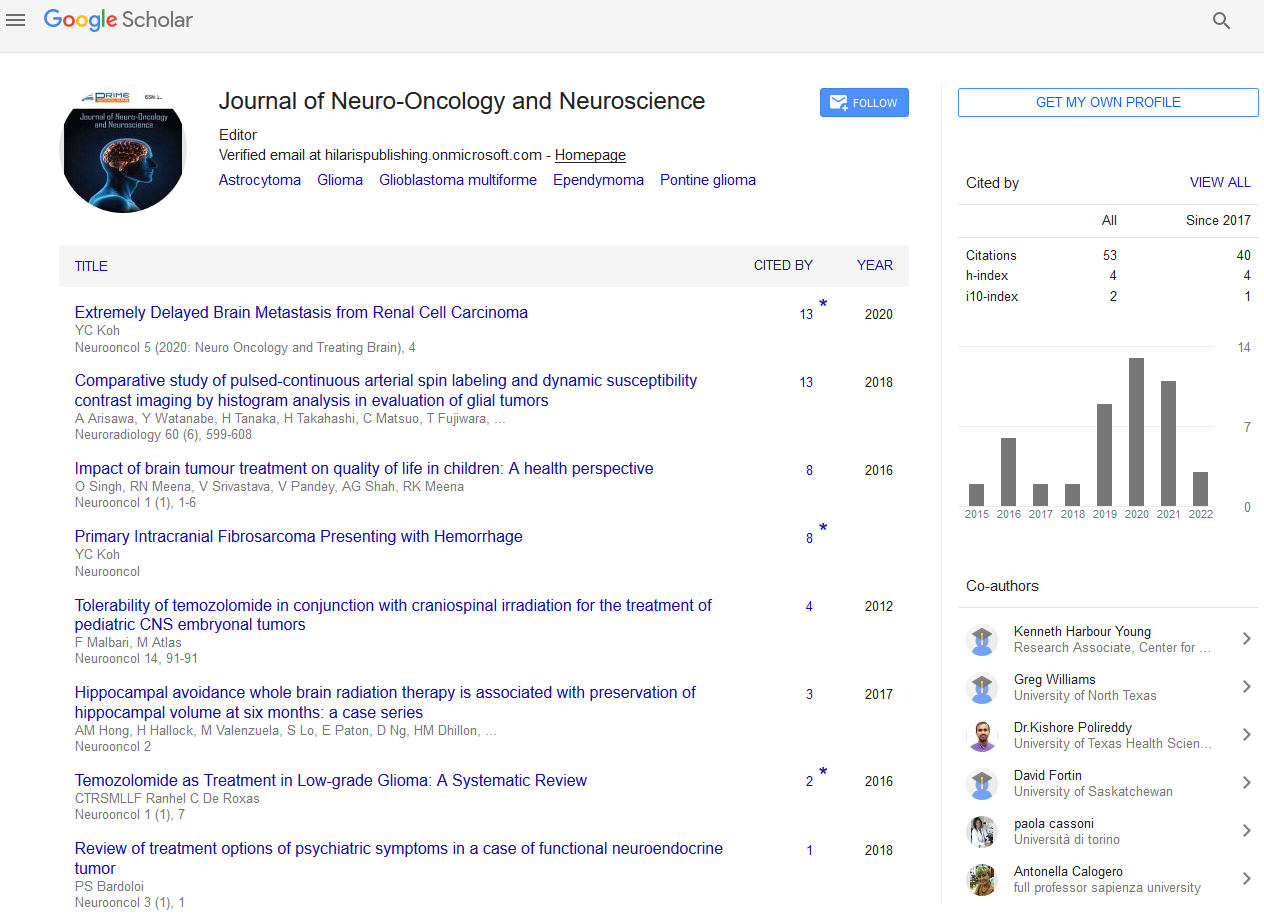Opinion Article - (2023) Volume 8, Issue 4
Unraveling the Genetic Complexity of Brain Tumors: Insights into Diagnosis and Treatment
Richard Hoeffken*
Department of Neuro-oncology, University of Belgrade, Serbia
*Correspondence:
Richard Hoeffken,
Department of Neuro-oncology, University of Belgrade,
Serbia,
Email:
Received: 29-Nov-2023, Manuscript No. IPJNO-24-19621;
Editor assigned: 01-Dec-2023, Pre QC No. IPJNO-24-19621 (PQ);
Reviewed: 15-Dec-2023, QC No. IPJNO-24-19621;
Revised: 20-Dec-2023, Manuscript No. IPJNO-24-19621 (R);
Published:
27-Dec-2023, DOI: 10.21767/2572-0376.8.4.36
Introduction
Brain tumors are among the most challenging and
heterogeneous of all cancers, with a wide range of subtypes
and genetic alterations contributing to their development
and progression. Advances in genomic technologies have
revolutionized our understanding of the molecular landscape
of brain tumors, revealing key genetic alterations that drive
tumorigenesis and offer insights into diagnosis, prognosis,
and treatment. By unraveling the genetic complexity of brain
tumors, researchers and clinicians are paving the way for
more personalized and effective approaches to diagnosis and
treatment. One of the most significant advancements in the
field of brain tumor genetics is the identification of recurrent
genetic alterations that define distinct molecular subtypes
of tumors. For example, glioblastoma, the most common
and aggressive type of primary brain tumor, is characterized
by mutations in genes such as EGFR, PTEN, TP53, and IDH1.
These genetic alterations influence tumor behavior, treatment
response, and patient outcomes, providing valuable prognostic
and predictive information for clinicians.
Description
The identification of genetic alterations associated with
tumor progression and treatment resistance has led to
the development of novel therapeutic strategies aimed at
overcoming these challenges. For example, alterations in the
DNA repair pathway, such as mutations in the MGMT gene,
can confer resistance to standard chemotherapy agents such
as temozolomide. In response, researchers are investigating
combination therapies that target multiple pathways involved
in tumor progression, including DNA repair mechanisms,
angiogenesis, and immune evasion. In addition to guiding
treatment decisions, genetic profiling of brain tumors
has implications for diagnosis, prognostication, and risk
stratification. Molecular subtyping based on genetic alterations
can help refine histological classification and provide additional
information to guide clinical management. For example, IDH1
mutations are associated with better prognosis in gliomas,
while mutations in the H3F3A gene are associated with poorer
prognosis in pediatric high-grade gliomas. By integrating
genetic information with traditional clinicopathological
features, clinicians can better stratify patients into risk groups
and tailor treatment strategies accordingly.
Furthermore, advances in genomic technologies have
facilitated the development of liquid biopsy approaches
for non-invasive detection and monitoring of brain tumor
genetic alterations. Circulating tumor DNA (ctDNA) and other
biomarkers present in blood or cerebrospinal fluid can provide
real-time information about tumor dynamics, treatment
response, and disease progression. Liquid biopsies offer the
potential for early detection of recurrence, monitoring of
treatment response, and identification of emerging resistance
mechanisms, enabling timely adjustments to treatment
regimens. Despite these advancements, challenges remain
in the translation of genomic findings into clinical practice,
including the need for standardized protocols for genomic
profiling, data interpretation, and integration into routine
clinical care. Additionally, disparities in access to genomic
testing and targeted therapies may limit the benefits of
precision medicine for certain patient populations. Addressing
these challenges requires ongoing research, collaboration, and
investment in infrastructure and resources to ensure that all
patients have access to the latest advances in genomic-driven
oncology care.
Conclusion
The genetics of brain tumors play a critical role in shaping
diagnosis, treatment, and outcomes for patients with these
devastating diseases. By unraveling the genetic complexity of
brain tumors, researchers and clinicians are gaining valuable
insights into the molecular mechanisms driving tumorigenesis
and treatment resistance. Through targeted therapies,
precision medicine approaches, and non-invasive monitoring
techniques, we are moving closer to personalized and
effective treatments for patients with brain tumors, ultimately
improving outcomes and quality of life for those affected by
these challenging diseases.
Citation: Hoeffken R (2023) Unraveling the Genetic Complexity of Brain Tumors: Insights into Diagnosis and Treatment. Neurooncol. 8:036.
Copyright: ©2023 Hoeffken R. This is an open-access article distributed under the terms of the Creative Commons Attribution License, which permits unrestricted use, distribution, and reproduction in any medium, provided the original author and source are credited.

